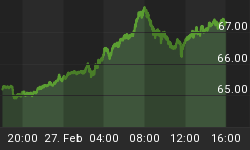Economic data over the past weeks, punctuated by last week's dismal employment reports, confirm the diminishing impact of the stimulus efforts orchestrated by the Obama Administration and the Federal Reserve. In what must be a huge disappointment to Keynesian enthusiasts, the record doses of both monetary and fiscal narcotics did not produce the desired results. In fact, the size and scope of the "recovery" of the past two years was weaker than would have been expected in a typical business cycle recovery without any stimulus whatsoever. Indeed our current recovery is the weakest on record, despite the biggest jolt of government stimulus ever administered.
But despite the gathering gloom Austan Goolsbee, the Chairman of the President's Council of Economic Advisors, argued over the weekend that the economy is on the right track and that the recent salvo of horrific economic reports were not significant.
The poor numbers, he said, resulted from external factors like the Japanese earthquake and the downgrade of European sovereign debt. I don't know if he really expects anyone to buy his story, but admitting you have a problem is the first step toward recovery.
In a sign that Mr. Goolsbee may have been getting increasingly uncomfortable with his job of economic propagandist, he abruptly resigned this week. He will be returning to academia where I'm sure he is hoping to avoid blame for the coming economic train wreck.
Although I have made these comparisons before, the parallel between drug addiction and the reliance on economic stimulus is just too strong to ignore. And as with drug addition, an economy builds up a tolerance. Each time the government successively stimulates with printed money or deficit spending, ever larger doses are needed to achieve the same result. Lest we forget, coming into the Crash of 2008, the economy had been on the receiving end of years of over stimulus. President Bush and Alan Greenspan never fully weaned the economy of their shock treatments that followed the dot.com crash and the shock of September 11th.
This time around, the stimulus-fueled recovery is so mild that the economy is already relapsing into recession before the Fed has even begun to tighten. This puts Bernanke in a very difficult position. He either follows through on his loudly trumpeted plans to end quantitative easing this summer, or abandon those plans in favor of more stimulus. Both choices are unappealing.
For full access to the remainder of this article, please click here.
Subscribe to Euro Pacific's Weekly Digest: Receive all commentaries by Peter Schiff, Michael Pento, and John Browne delivered to your inbox every Monday.
Click here for free access to Euro Pacific's new special report: What's Ahead for Canadian Energy Trusts?
Be sure to pick up a copy of Peter Schiff's hit economic fable, How an Economy Grows and Why It Crashes.















